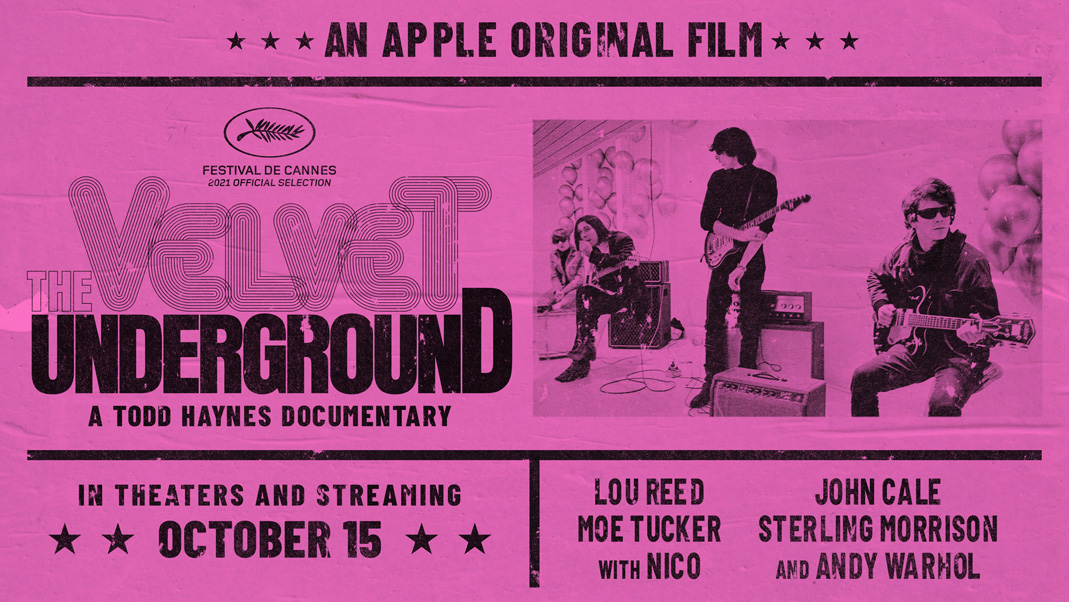By Glenn Dunks

It feels like something of a miracle that The Velvet Underground is as good as it is. Music bio-docs are hardly the most invigorating brand of documentary these days, and the story of this band and their Factory adjacent avant-garde artworld has been told many, many times before. So much so that Andy Warhol, the emperor of this New York underground art scene, would have probably been impressed by the assembly line of documentaries that emerged about him and his assorted acolytes, hangers-on, and affiliated artists whose fame (and/or infamy) are directly tied to him.
That Todd Haynes has made a great movie out of this all is hardly a surprise, though. After all, he is the man behind the 1998 glam rock opera Velvet Goldmine. Having said that, the recent milieu within which he has been working in Dark Waters and Wonderstruck hardly signposted that he had something so frenetically electric in him. If we never get another documentary about The Velvet Underground then it probably wouldn’t matter because we have this.
Here, Haynes pushes the concept of a conventional bio-doc about as far as he can while remaining something your average punter might potentially watch on Apple TV+. Its narrative is linear, and his talking points more or less very familiar—whether you’re a fan (I am) or not, the Velvets’ trajectory as rock stars is hardly unique even if their music was. But its Haynes’ eye as a master stylist within his knack for heightened drama that gives The Velvet Underground what makes it special.

Through its two-hour runtime, he utilises a wide array of cinematic tricks to make this is thoroughly engaging as possible. He makes maximum use of split screens (itself, obviously, a noted technique of Warhol’s art films) and incorporates a long list of avant-garde and experimental cinema, and music. In early sequences, bandmembers Lou Reed and John Cale are introduced with length single takes from Warhol’s screentests embedded next to archival footage from their childhoods. Elsewhere, cinematic light shows by Jonas Mekas illustrate chaos and plaintive reflections in equal measure.
Haynes infuses the band’s revolutionary soundscapes into his film beyond just performance clips (many built into their own music videos of sorts), allowing the hums and the scratches of their records to reverberate around its edges and influence the storytelling rhythms. The use of 16mm for the talking heads is a stroke of genius from cinematographer Edward Lachman. A timeless aesthetic choice as well as a intellectual and poignantly era-specific one. And speaking of those talking heads—they are much more a central heart of the film than usual. Maureen Tucker, drummer for the band; Amy Taubin, arts critic for Film Comment; Mary Woronov, Warhol star… all such great physical presences on screen with the stories to match.
Of course, the stars here are definitely The Velvet Underground. You likely wouldn’t watch a film like this if you weren’t somewhat aware of their (shall we say eclectic) music. But despite its title, The Velvet Underground covers a whole lot more than just a band as it rose, peaked, spiralled and crashed. It takes in an entire era, as it should, but never loses sight of why viewers are there in the first place. I came out of this quite emotional, taken aback by how deeply fond of them I am as pioneers and emblems. If you’re as much a fan of the band as I am, then I don’t know how you can’t. It hits in a way that these films too often don’t. How it will play if you’re not a fan? That I can’t answer, unfortunately.
The adage goes that only 30,000 people bought The Velvet Underground records, but every one of those who did went on to start a band. Wouldn’t it be nice if the same were true of Haynes as a filmmaker. We could do with more POVs like his.
Release: Streaming worldwide on Apple TV+ from this Friday. Also in some limited U.S. theaters.
Award chances: I expect Apple to submit for Oscar rather than the Emmy. It’s been six years since What Happened Miss Simone? was nominated and no similarly music docs have been nominated since. The Academy at large has never been a fan of this era on screen for whatever reason, and I suspect even Haynes’ name won’t be enough for them to start now. After all, the doc branch can often feel a bit hesitant about outsiders with big names just swanning in from the comfort zone of fiction cinema. Having said all that, I reckon it will be popular with awards bodies and depending on how the wins blow they could be impressed enough to get Haynes his second Oscar nomination.